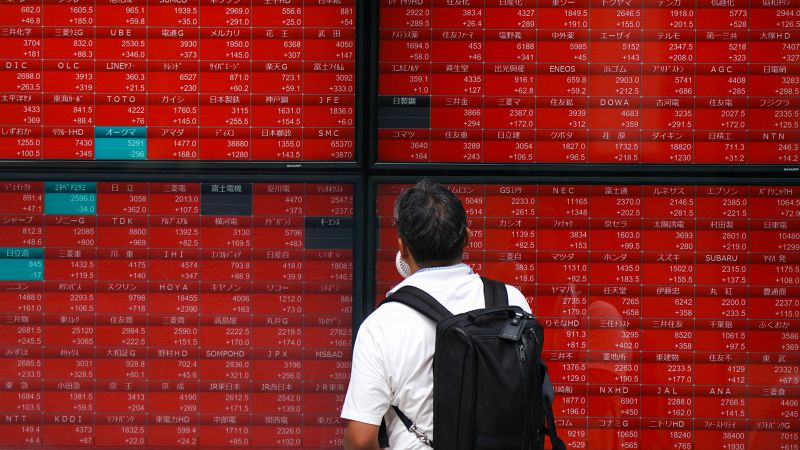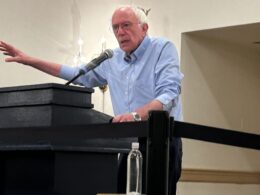Hong Kong/London
CNN
—
Japanese shares soared Tuesday, clawing back some of their record losses from the previous day and underpinning a patchy recovery on global markets.
The benchmark Nikkei 225 index finished 10% higher and the broader Topix closed around 9% up. Elsewhere in Asia, South Korea’s Kospi rebounded by 3.3%, while Taiwan stocks gained 3.4%. However, Hong Kong’s Hang Seng Index, which closed later, was down 0.3%.
Markets around the world plunged during Monday’s session when a combination of fears about a slowing US economy, rising Japanese interest rates and crumbling tech stocks combined to trigger a meltdown.
Although stocks in Europe also recouped some of their losses in early Tuesday trade, they ticked down by late morning. The Stoxx 600 index, the region’s benchmark, was trading 0.3% down on the day by 5.53 a.m. ET, having lost 2.2% the day before. London’s FTSE 100 edged 0.3% lower by the same time.
US stocks were set to open higher, with futures contracts climbing in pre-market trade. S&P 500 futures were up 0.4% and Nasdaq futures up 0.3%.
The bounce in Japan is “typical after a market crash,” Neil Newman, head of strategy at Astris Advisory in Tokyo, told CNN. “Importantly: Fundamentals are sound, the economy is doing fine, there is no evidence of abandoning Japanese equities.”
But short-term volatility in the stock market remains as the market believes the US dollar has not yet stabilized against the Japanese yen, analysts from UBS Chief Investment Office wrote in a research report Tuesday.
“It is too early to conclude that the Japanese stock market has hit a bottom,” they said, adding that any recovery would likely only occur after Japanese companies report first-half earnings in October, or even after the US presidential election in November.
On Monday, the Nikkei closed 12.4% lower in its largest percentage one-day drop since October 1987. It lost 4,451, its biggest ever decline by number of points. The plunge triggered a global market rout. All major Asian, European and US markets fell substantially.
Wall Street also took a beating with all three major indexes falling between 2.6% and 3.4% on fears the US economy was slowing faster than expected.
Growing worries about a recession in the US economy and the rapid unwinding of popular carry trades involving the yen had sent global markets into a tailspin starting Friday.
“Much of the [market] downturn reflects concerns that the US may be heading for a recession,” said analysts from Moody’s Analytics in a note Tuesday.
AI-related tech stocks also suffered, impacting equity valuations across Taiwan and South Korea, where chipmakers produce most of the world’s supply of high-end semiconductors used in AI applications, they said.
A stronger yen
Japan’s stock market, in particular, was hard-hit by the rapid appreciation of the yen, which undermines the export competitiveness of the country’s manufacturers.
On Monday, the yen hit a seven-month high against the US dollar at around 143. It pulled back Tuesday, down about 1.2% to 146.
The surge in the yen, which started when the Bank of Japan (BOJ) signaled a hawkish tilt in monetary policy in recent weeks, forced many market participants to quickly unwind their yen carry trades, a popular investment strategy.
Decades of extremely low interest rates in Japan have seen many investors borrow cash cheaply there before converting it to other currencies to invest in higher-yielding assets. The undoing of this strategy is the major trigger for the market upheaval, said Stephen Innes, managing partner of SPI Asset Management.
Tokyo “represents the epicenter of carry trade unwinds, where the ripple effects were most acutely felt, exacerbating the turbulence and uncertainty for traders and investors alike,” he said.
On Wednesday, the BOJ raised interest rates for the second time this year and announced plans to taper its bond buying. Traders expect more rate hikes to come later this year as the central bank tries to contain inflation.
“I think (the panic over the central bank decision) has been digested, but there are lingering concerns,” Newman said. “The big question now is will the BOJ follow through with another rate rise given all the criticism in the press. I believe they will and are not swayed by public or press opinion.”
More than half of what Japan produces is sold overseas, Newman added, in a process of offshoring that started in the 1980s with automobile production in the US.
What’s important for small- and medium-size companies that employ the bulk of Japan’s workforce is the high cost of raw materials and energy, which have been exacerbated by the weak yen, he said. That’s why the BOJ may be under pressure to bolster the Japanese currency.
Speaking Tuesday, Japanese Prime Minister Fumio Kishida said it was important to make calm judgements about the market situation, according to Reuters. He reportedly shared an optimistic outlook for the economy, citing factors like the first rise in inflation-adjusted real wages in more than two years, which happened in June.
This story has been updated with additional information.








